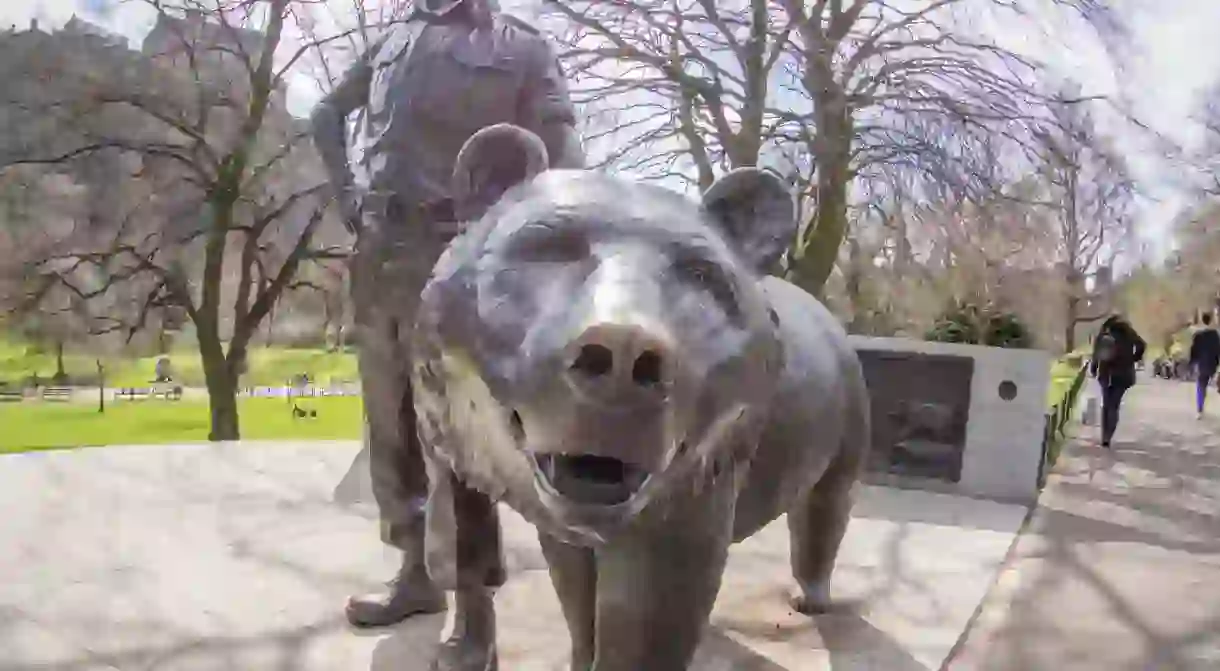Introducing 'the Joyful Warrior': Here's How a Bear Helped the Polish in WWII

It was in the fateful days of early 1942, as the wandering divisions of the recently recruited Polish army moved southwards to connect with the British in the Levant, that a chance meeting between one lieutenant, Anatol Tarnowiecki, and a young Iranian herder brought perhaps the most curious soldier ever into Allied ranks. That soldier was not a man, nor a woman, but a bear. Tarnowiecki is said to have traded a nifty Swiss knife and a bar of chocolate for the creature. Later, that fluffy Syrian brown bear was to become a legend; a famous addition to the Polish corps who not only helped push the Nazi scourge back through Europe, but also became a totem of humanity amidst the chaos.
Becoming Private Wojtek
In his earliest years, it’s said that Wojtek the bear (as he’d quickly come to be known amongst the Polish soldiers) was a playful and curious creature. He was fond of jutting his head out of ammunition transport trucks, playfully wrestling with his fellow troops and even munching on cigarettes while his comrades in arms smoked.

By 1944 Wojtek had staked his place in the ranks of his adopted 22nd Artillery Supply Company so well, becoming a mascot and a furry shoulder to lean on, that he was officially drafted into the Polish army corps. He took the rank of private, was issued a serial number and even a standardised pay book (even if Wojtek preferred to swap his military salary for double rations of food).
Battling with Wojtek
It didn’t take long until Wojtek the bear was an integral part of the Polish II Corps, having moved all over Europe with his regiment, doing battle with the Nazis on several occasions. He went from Syria (the place of his birth) through Egypt and Palestine, finally arriving on the edge of the Italian campaign with his newfound official rank of private.
It was this push through the Italian Boot that was to prove the most defining of all of Wojtek’s wartime efforts. It’s said that he left countless Allied troops speechless in the definitive Battle of Monte Cassino when he was spotted carrying artillery shells from gun to gun. After the defeat of the Axis troops there, he rose to fame across the continent, and his efforts were immortalised in the new official regalia of the 22nd Artillery regiment: the outline of a bear carrying ammunition.
The legend lives on
Today, the memory of Wojtek the Soldier Bear lives on. His story is chronicled in both film and prose, while tales of his later life in a displaced person’s camp in the highlands of Scotland tell of a wild creature truly at ease with human company.
As the post-war period went on, and more and more of his comrades were returned to Soviet-occupied Poland, Wojtek needed somewhere new to call home. He was transferred to Edinburgh Zoo, where he was often spotted wrestling with his former wartime friends and honoured with countless visitors come to pay their respects.
Unfortunately, The Joyful Warrior Wojtek died in captivity in Edinburgh in 1963. He left a story and a legacy that’s inspired countless memorials and monuments, from the roaring outline of a great fur-clad monster between the trees of Krakow’s Jordana Park to a thought-provoking, human like effigy in the halls of the Sikorski Museum in London.













